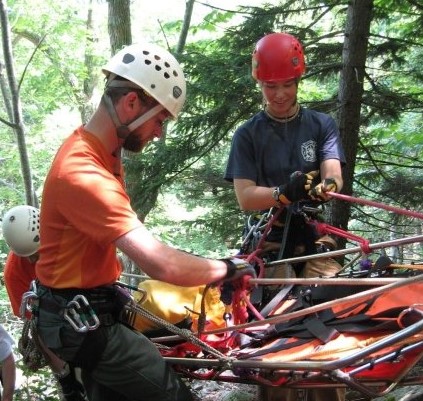Special Interests: Professor Search and Rescue

Geology Professor Pete Berquist started participating in search-and-rescue missions at Acadia National Park more than 15 years ago.
Before joining Thomas Nelson's faculty in 2007, Pete Berquist was a ranger at Acadia National Park in Maine for three years. He was also a visiting faculty member at a nearby college.
"It kept me in geology and teaching, which is what I like doing," he said. "It also allowed me to stay in kind of an outdoor-education realm, which is something I've always been interested in and engaged with."
Two of his other longtime interests are rock climbing and ropes courses, which he was first exposed to as a teenager growing up in Williamsburg. He later attended Thomas Nelson and the College of William & Mary. All those interests made search-and-rescue operations a logical pursuit, one that started in Maine in 2005 and continues to this day.
"I liked being able to combine (all those interests) with wilderness medicine and just being able to help people," he said. "Those desires all melded into formally getting involved in search-and rescue."
Admittedly, search-and-rescue on Mount Katahdin, which is at the northern end of the Appalachian Trail, and Baxter State Park is much different from search-and-rescue in Southeastern Virginia.
"There is no equivalent to that really except for doing search-and-rescue on the water," Berquist said. "That's what drew me into the Coast Guard Auxiliary, being able to support search-and-rescue."
He's been a member of the Coast Guard Auxiliary for 13 years but doesn't get called out often, although he did participate in a search-and-rescue mission in late September. He said the trend the past 10-20 years has been for the federal government to provide local agencies with more funding for search-and-rescue operations and equipment.
"As the local agencies have acquired boats and resources and experience on the water, they've been able to rely less and less on the Coast Guard," he said.
However, for Berquist to keep his Coast Guard qualifications, he must put in a certain number of hours each year, as well as meet proficiency requirements.
"I'm trained throughout the year," he said. "But it's very seldom that we get called."
That training paid off on the call in September. When he was doing search and rescue in Maine, he often had multiple cases each day, which kept him sharp mentally as well as physically.
"What struck me this time since it had been such a long time being engaged, emotionally I felt out of practice," he said. "That's part of why we train, so that you have better resilience for the unexpected things that creep in."
He said every mission is memorable, and he knows many could have been avoided, but he doesn't like to use the word "frustrated" to describe any situation.
"I don't know if I would ever get to the point of frustration because I have certainly done some dumb things, and I have certainly cut corners and I have been very lucky," he said. "And there are times when I haven't been lucky."
He realizes things happen, and while intentional or gross negligence might have led to a situation, he tries to be compassionate. It's more important to be more concerned with helping the people in trouble than with how they got there. He admits that's not as easy as it sounds when the situation is severe.
However, there are some cases that bother him more than others.
"When I see adults that are doing things that are irresponsible that impact kids, that's one for me that I think I would use the language 'frustrating,'" he said.
Becoming angry might be a natural response, but he said that wastes energy needed to be productive.
"You realize these people are in bad spots, too," he said.
The successful missions make it all worthwhile, especially since so many of his interests are at play.
"That's kind of a cool intersection of personal and professional interests to be able to see how you can use your skills for good and for helping people," he said.
About Special Interests: This is the first in a series highlighting outside interests of Thomas Nelson faculty and staff. If you would like to recommend someone or yourself, please email Bob Flynn in Communications and Marketing at flynnr@tncc.edu.
